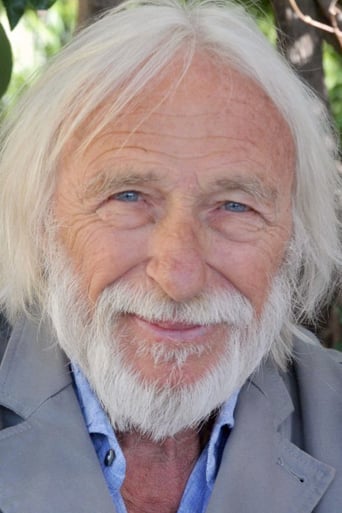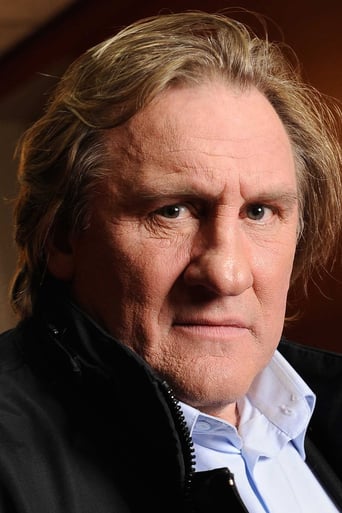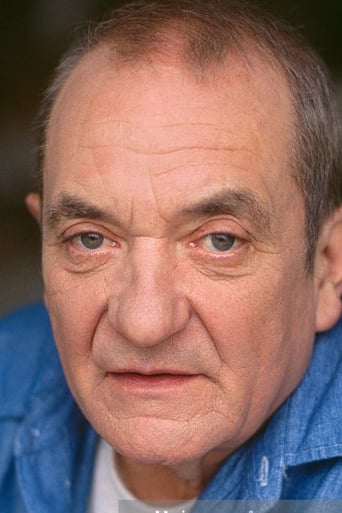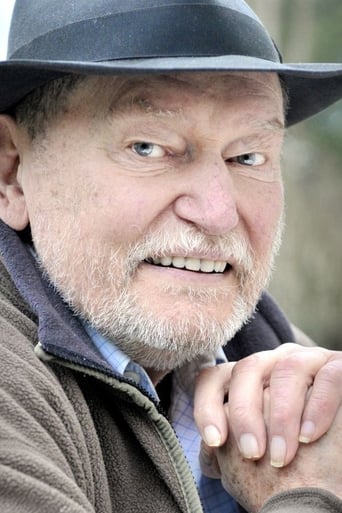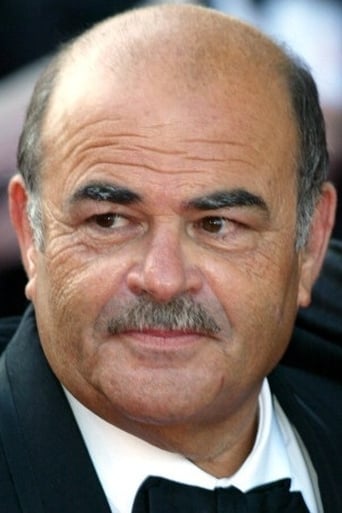leplatypus
because it's her only movie as she took a career as teacher. Anyway this is a great movie that brilliantly mixes drama and comedy: it's about a single father who is pushed to the limits by markets law (jobless) but rather to find a bluesy movie, we have a funny one because this poor lad is rather unlucky! It may be the last team-up between Gerard and Pierre but it may be their best because they are in symbiosis now and above all, they are really tied together by the essential link of this child: she is really the heart of the movie and with few words (she is nearly mute) every body will understand all the joy and responsibility to be a parent. At last, this movie smells good the 80s when the french cinema was popular, faraway of Paris and the Bobos, made with limited money but real conviction so it's a high recommendation! As it's indeed a great french movie, I really wonder what the American remake looks like, all the more than the cast seems appropriate with Short and Nolte
ElMaruecan82
"The Fugitives" marks Francis Veber's last collaboration with the Pierre Richard – Gérard Depardieu duo and the last opus of an unofficial trilogy that started with "The Goat". For information, the second one, "ComDads" earned a César nomination for Gérard Depardieu in the Best Actor category and one for Veber for Best Screenplay. "The Fugitives"'s screenplay was also César-nominated, so was the performance of Jean Carmet for Best Supporting Actor, and if not better than "The Goat", the film beautifully concludes the misadventures of the oddest yet most defining duos of French Comedy.Indeed, the 60's had Louis de Funès and Bourvil, the hot-tempered middle-aged man and the lovable idiot, the 80's would have Pierre Richard and Gérard Depardieu, the likable loser and the no-nonsense tough guy, a formula that proved to be successful in the three movies. The word 'formula' is less meant to diminish Veber 's creativity than to highlight his writing talent, as he builds similar plots from totally different situations and manage to make something fresh out of a usual comical material, which mostly relies on the opposition between the two leads leading to some chaotic situations, but it's only from Veber's chaos that something positive can finally rise.In the first two movies, Depardieu and Richard were hired to look for someone who disappeared, the unlucky daughter of a rich businessman, the runaway son of an ex-youth's love, and at the end a very precious lesson about life and acceptance predominated the resolution of the plot. In "The Fugitives", the plot begins with a more dramatic tone. Depardieu plays Lucas, an ex-bank robber released from jail after a five-year sentence and Richard is François Pignon, an unemployed widower, and the father of a 6-year old little daughter, pushed by circumstances to accomplish one of the most pathetic bank robberies that ever disgraced the silver screen, so he can get the money to flee, otherwise his sickly daughter Jeanne, would be put in an orphan. There is a strange and cleverly written parallel between Lucas and Pignon, one is an ex-criminal who wants to go straight while the other, although well-intentioned, becomes a criminal. Talk about a perfect timing to meet each other.Indeed, the plot reveals its clever intricacy when Pignon decides to take one hostage and of course, his eyes go immediately to Lucas who only came to open an account and put the money he got from selling his gold watch. Right before the robbery, we see Lucas harassed by the Police Chief who counts on another arrest for his promotion, but Depardieu, with a remarkable talent, beautifully embodies the sincerity of a man who wants to get straight and means it. So when he's chosen as the hostage, aware of the confusion it will place in the Chief's mind, he gently whispers "can't you take another?" Of course, there would have been no story if Pignon followed his advice. Naturally, Pignon disobeys and what comes next confirms Lucas' fears as he's forced to play the robber for his own safety. Accidentally shooting at his leg when they try to escape, Pignon puts the ill-fated Lucas in a situation where he will have to depend on him for a while. The story takes off.Pignon sends Lucas to Jean Carmet; a doctor who happens to be more competent with animals, one of the film's best moments when he talks to him as if he was a dog (probably lost in translation, because the word for 'bullet' is the same as 'ball') However, the middle act of the film strikes by a certain dryness of gags, and a storyline getting more serious and more pathetic. The name 'Pignon' doesn't epitomize the idea of the lovable loser that would become a character's trademark in most Veber movies, this time, the film is borderline a poignant drama. But while Pignon struggles to get the papers and ask for a corrupt individual named Lahbib to help him, another storyline develops in a slow but beautiful way. Lucas lies in the doctor's bed and Jeanne takes care of film, she doesn't speak a word since her mother died. Lucas' contempt for Pignon is constant during the two thirds of the film but it's compensated by the growing fondness he has on Jeanne. The little girl is convincing in the role of a sad wounded heart and plays as the perfect 'third' emotional link for the duo.And it's not surprising that she would play a very pivotal role in the evolution of Lucas and Pignon's, friendlier in what seems to be a farewell scene, beautifully written by Francis Veber. She found a great fatherly figure in Lucas, possessing whatever is lacking in his father, and she can imagine having a future with both of them. Maybe the film suffers from too much emotionality that distracts from its original comedic purpose and I might agree with that, except that "The Fugitives" totally redeems itself in the last twenty minutes. The final act of "The Fugitives" is on the same level of comedic genius as "The Goat", even better sometimes, in fact, it gets funnier one scene after another with a level of slapstick and comedy of situation you wouldn't have expected after such a dramatic set-up. Maybe the film got too emotional at some parts, but the pay-off was worth it. And at least, it didn't forget to be a comedy."The Fugitives" is the cinematic proof that the effect a film can have on you mostly depends on the last part, that's why it should be judged till the end to be properly judged, and at the end, it's impossible to resist to this trio, this good-hearted bear, this funny-looking clown and this adorable little girl. The film beautifully balance between laughs and emotion until a magnificent finale transcended by Wladimir Cosma's score, one of his best, while we see the duo disappearing in the landscape, for the last time.
david-sarkies
There is one thing the Americans are good at: taking a perfectly good French Movie and totally stuffing it up – and they change very little in it as well. This movie is the original French version of what became Three Fugitives, and this movie is by far the better.What is amazing is that the two movies are almost identical, right down to the scene where the robber has a stocking over his head, and when he removes a pin from a grenade, the stocking melts, but it is done far better in the French movie than it is done in the American.Basically the movie is about a professional bank robber who is released from gaol and happens to end up in a bank that is held up, and he is taken hostage. Because the police do not trust him, they accuse him of robbing the bank. The third fugitive is a little girl who has not spoken since her mother died.The basic themes of this movie is about relationships, and how one's actions can destroy the lives of more than one person. Here the bank robber not only upsets his life, but also the life of his little girl and the recently released convict. He believes that by doing this he will help out his little girl, but in the end he ends up hurting her. It is also interesting to see that the convict has a human heart (what else is he going to have?). What I mean is that he acts with a cold and mean demeanor, but in truth he does care for the girl, and the robber who is really just stupid.This is a cute little film, especially the one made in France. The little girl is just adorable, and her sad demeanor does tear your heart.
writers_reign
I'm in complete awe of Francis Veber as both a writer and a director. How he can continue to ring even more changes out of what is essentially a Johnny-one-note idea both amaze and delight. Here he is at it again and, for good measure, adds a soupcon of sensitivity into the mix. Maybe, as a previous commenter has stated, we should just bask in the invention, charm and acting skills on display and not attempt analysis. Depardieu is now, of course, arguably the best-known and best-loved contemporary French actor in the world by virtue, and rightly so, of his unsurpassed range rather than the occasional English-speaking role but Gene Wilder lookalike Pierre Richard is virtually unknown outside France - at least in England - which is sad. Now aged 70 he continues to work - not, alas, with Veber - and as I write is appearing on the Paris stage in a piece which translates to 'Fish Out Of Water', as good a description as any for the inept bank-robber he plays here, basically a nerd desperate to bankroll a cure for his young daughter, rendered mute since witnessing the death of her mother. As luck - or meet-cute scripting - would have it, ex-con Depardieu (he literally left the slammer minutes earlier) is in the bank when Richard holds it up and of all the hostages he COULD pick to help him getaway he picks Depardieu, natch. From then on it's business as usual, two opposites who attract the flics. Replete with both sight gags and verbal wit this is one to cherish. 9/10

